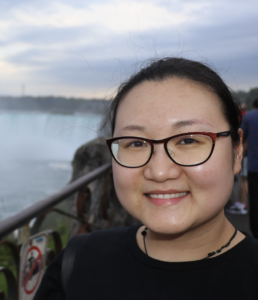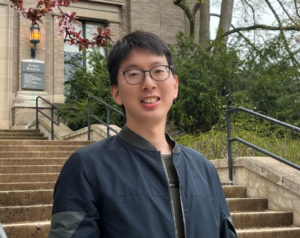Dr. Kim SCT Travel Grant Award to Zhaoyu (Miranda) Wang and Xixin Qiu
We are pleased to announce that Zhaoyu (Miranda) Wang, PhD student in Curriculum and Instruction, and Xixin Qiu, PhD Student in Applied Linguistics have been awarded the 2024 Dr. Kim Sociocultural Theory (SCT) Travel Grant. The winning titles and abstracts are included below.
Dr. Kim SCT Travel Grant was established through the generosity of Dr. Jiyun Kim, a graduate of Penn State’s doctoral program in applied linguistics, for graduate student travel to present at the annual meeting of the Sociocultural Theory L2 Research Group, or to present a paper significantly informed by sociocultural theory at a national or international conference. For more information, see our Dr. Kim SCT Travel Grant page.

Using Dynamic Assessment to Promote Argumentative Writing Development among High School Multilingual Learners (Zhaoyu (Miranda) Wang)
This presentation reports a dynamic assessment study on ESL argumentative writing of a high school multilingual learner. Dynamic assessment (henceforth, DA), stemming from the Vygotskian concept of Zone of Proximal Development (ZPD), is an alternative testing tool that integrates assessment and instruction to achieve twofold purposes of diagnosis and prognosis (Poehner, 2008; Vygotsky, 1978). DA, through promoting the interactions between the examiner and the examinee/learner, can identify learner difficulties and thus inform subsequent instruction to better target such difficulties.
Argumentative writing is emphasized throughout K-12 grades in the U.S. education system (Common Core, 2011). Scholars have argued an effective rhetorical structure, including claim, evidence, reasoning, counterclaim, and rebuttal, is positively associated with higher writing quality (e.g., Rusfandi, 2015). Therefore, in this study, an important focus was placed on helping participants understand and effectively use this structure in their writing.
Data reported in the presentation came from a larger writing intervention project that aims to promote high school multilingual learners’ argumentative writing in English. Lilith (pseudonym), a 10th-grade Russian-speaking Uzbekistani student, was one of the eight participants in the study. Results from her first DA session demonstrated three important findings. First, Lilith showed a creative way of comprehending the English language by proposing an alternative claim in her essay. Second, despite having no prior academic training in argumentative writing, she understood the importance of using multimodal tools to appeal to different audience groups. Third, she was able to use rebuttal to strengthen her arguments under the mediation of the examiner.
Attendees of this discussion will be invited to compare Lilith’s essays pre-and-post DA to examine the differences in her writing. Excerpts of transcripts of the interactions between the examiner and Lilith will also be shared to facilitate the understanding of the co-constructed learning moments and developmental opportunities.

Exploring the Effect of Corpus-Based Writing Instruction on Learner-Corpus Interaction in L2 Revision: A Study of Chinese EFL Disciplinary Writers (Xixin Qiu)
The pedagogical applications of academic corpora in second language (L2) writing instruction have garnered considerable interest over the past decade (Boulton & Cobb, 2017; Chen & Flowerdew, 2018; Tribble, 2015). Relevant research into the effectiveness of corpus consultation tended to focus on students’ self-reported attitudes and perceptions towards corpus queries upon intervention; what is relatively unknown is learners’ actual writing experiences in association with employing disciplinary corpus tools beyond the classroom context. To address this gap, the present case study investigates five Chinese engineering graduate students’ learning of discipline-appropriate sentence constructions within a five-week corpus-based writing instruction (CBWI), with a specific focus on post-intervention revision. Using pedagogical materials informed by a genre- and discipline-specific corpus, the first author designed and enacted five corpus-based writing tutoring sessions informed by concept-based language instruction (C-BLI; Lantolf et al., 2021) to enhance writing skills in constructing discipline-appropriate sentence connections (e.g., information flow and stance taking).
Using a qualitative case study method, the present study selects two focal participants’ in-class and post-intervention corpus use patterns based on “maximum variation” sampling (Lincoln & Guba, 1985). Adapting thematic analysis and the coding scheme of the digital problem-solving process developed by Yoon (2016), we coded and analyzed the screen recordings of draft revising and the participants’ stimulated recalls. The preliminary results indicate that while the two participants are proficient in practicing in-class corpus queries, their corresponding revising strategies show diverging levels of internalization of using corpus for discipline-specific queries. Further qualitative comparisons of the two participants’ writing process reveal that while one participant frequently drew on corpus searches for verification of general usage and cross-validation purposes, the other predominantly consulted online translation tools for the elicitation of L2 equivalents. The presentation closes with a discussion on how to sustain student post-intervention corpus use and leverage CBWI for discipline-appropriate expressions in advanced EAP writing pedagogy.